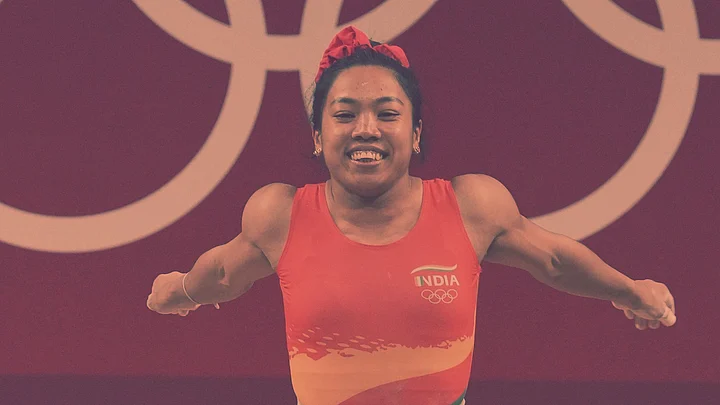Weightlifter Saikhom Mirabai Chanu has made Manipur, the Northeast and India proud by bagging silver in the Tokyo Olympics. Netizens are going the whole hog, eulogising her achievement, and rightfully so.
A person from the Northeast, for a change, is being called ‘Bharat ki beti’ (India’s daughter) instead of ‘Momo’ or ‘Chinese’, and is even drawing comparisons to the 16th-century poet Mirabai. For a while, the Northeast is hogging the limelight for the right reasons.
But the big question is, for how long? Will her win, and social media’s acceptance of Mirabai Chanu as “one of their own”, change things on the ground for Northeasterners in the so-called mainland India?
Mary Kom’s Olympics Glory
Cut to 2012, when ace boxer Mary Kom won bronze at the Summer Olympics. The nation rose to welcome her, accolades followed, and Bollywood made a film on her story. It is another matter that they chose to star Priyanka Chopra in the lead role because of the “bankability” factor, and not someone from the Northeast. Though the producers had their commercial concerns, the decision drew criticism and raised questions over the acceptability of a person with oriental looks in mainstream Bollywood cinema.
Even though Mary Kom became a household name and people from mainland India came to know how many states there are in the Northeast, not many changes were seen on the ground in terms of people’s attitude towards Northeasterners.
People continued to call Northeasterners ‘Momo’, ‘Chowmein’ and ‘Chinese’, and hate attacks and obnoxious abuse continued all across India. Two years after Mary Kom’s Olympics glory, Nido Tania, a student from Arunachal Pradesh, died after he was attacked by a group of people in Delhi’s Lajpat Nagar for protesting an alleged racial slur.
Such distasteful remarks continue to be reported even today. A couple of months ago, a popular YouTuber referred to Arunachal Pradesh as part of China and called a sitting MLA from the state ‘Chinese’. He was arrested and later granted bail.
Around the same time, a senior journalist suggested that Nagaland and India are separate entities, and was quick to apologise upon realising the blunder, terming it as a "slip of the tongue".
Around a year ago, during the COVID-19 outbreak, there were reports of people from the Northeastern states being targeted in many cities. In some cases, they were taunted as ‘coronavirus’ or ‘Chinese’ or denied entry into malls. There were also reports of eviction threats and forced quarantine of Northeast natives. And it is not that only people with Mongolian looks experience such conceited behaviour. Just mention your native place and you are bombarded with strange questions when people come to know you are from the Northeast.
Questions such as “Do you eat everything under the sun?”, “What language do you speak, Chinese, Nepali?”, “Do you often go to China? How far is Japan?”, “Do you need a passport to come to India?”, “Any militants in the family?”, “Any colleges out there?”, “Heard you get drugs in shops?”, are not uncommon.
Specifically, I have also been told – “How come you look ‘normal’?”, “Thakur? That’s north Indian?”, “You don’t look like a Northeastern?”.
The religion angle is being played out on social media even now, with discussions happening around whether Mirabai Chanu is a Hindu or a Christian, as if being either of them will elevate or dampen her feat. Some are comparing Mirabai Chanu with the poet Mirabai. Such an analogy is drawn even for Ahom general Lachit Borphukan, who is often called Assam’s Shivaji (referring to Maratha King Chhatrapati Shivaji Maharaj).
For those who may not know, Lachit Barphukan defeated Mughal King Aurangazeb’s forces led by Raja Ram Singh in the famous Battle of Saraighat in Guwahati, which is folklore in Assamese history. Though no such parallels or certifications are needed, as Mirabai Chanu and Lachit Barphukan have done enough to merit a place in history.
Can Laws Really Help?
After the uproar over Nido Tania’s death, The Union Home Ministry had set up a committee under retired IAS officer M.P. Bezbaruah to look into the concerns of people from the Northeastern states living in different parts of the country and suggest suitable remedial measures.
Among many short- and long-term measures, the panel recommended a new law against discrimination, fast-track courts and more teeth to police to deal with such cases, interventions in education and lessons about the Northeast in NCERT books, and social outreach and awareness programmes, etc. The penal had also recommended that derogatory words against Northeast people be made an offence. Implementation of the recommendations, however, remains a key concern. In 2016, the NCERT also published a book titled ‘North East India – People, History and Culture. Some of its social science textbooks also have mentions of the region.
But all said and done, no law or legislation will help if they are limited to tokenism. And in cases where people’s mindset is involved, the threat of penal action would also be of little use.
The key ideas here are awareness, education, assimilation and acceptance. Indians must accept people from the Northeast as they are. The media with its tremendous reach can play a big role in the ‘awareness’ and ‘education’ part by highlighting more news from the region.
To be an optimist, one can only hope that Mirabai Chanu’s win and “acceptance” is another big step towards the long but possible road towards the assimilation of the Northeast with mainland India. The next big step would be casting someone from the Northeast when Bollywood decides to make a film on the life of the ace weightlifter who has made all of us proud today.
(The author is an independent journalist and content creator from Assam based in Delhi. Views expressed are personal. The Quint neither endorses nor is responsible for them.)
(At The Quint, we question everything. Play an active role in shaping our journalism by becoming a member today.)
